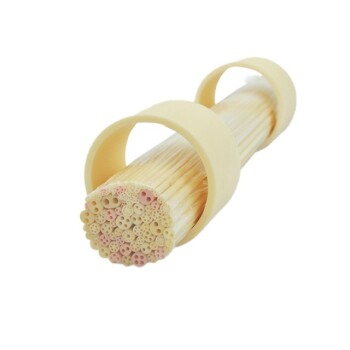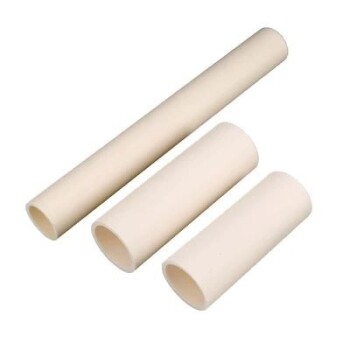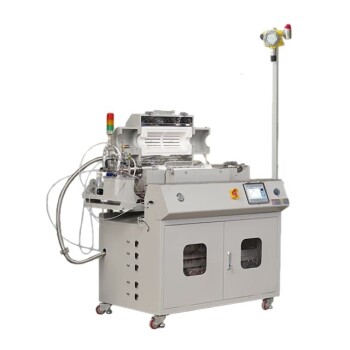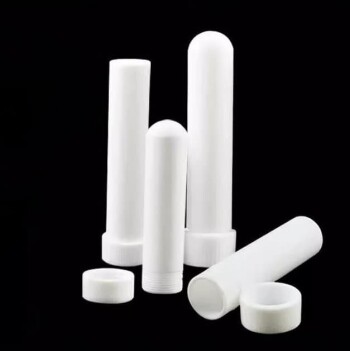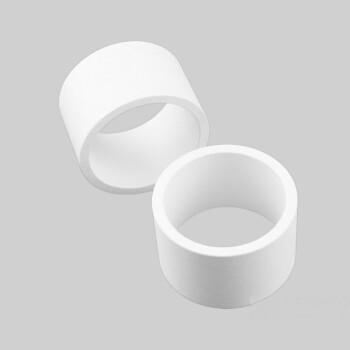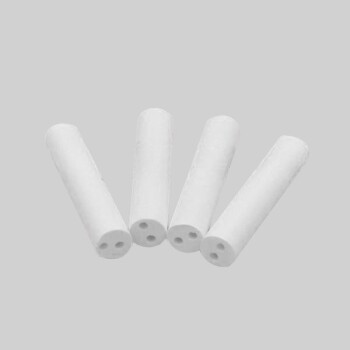At its core, the strength of a quartz tube is rated to withstand a stress of up to 0.68 x 10^7 Pa, which is equivalent to 1,000 psi, without failing or deforming. This specific value, however, only tells part of the story. The true strength and suitability of a quartz tube are defined by its performance under a combination of pressure, extreme temperature, and the need for chemical purity.
A quartz tube's value isn't just its mechanical strength, but its unique ability to maintain that strength and its structural integrity in high-temperature, high-purity, and vacuum environments where most other materials would fail.
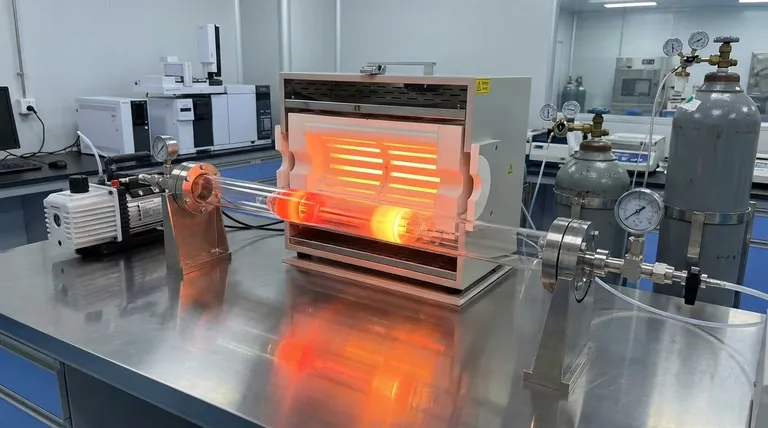
Deconstructing Quartz Tube Strength
The term "strength" encompasses several key material properties. For a quartz tube used in technical applications, this goes beyond a simple pressure rating to include its ability to function as part of a complex system.
### Tensile and Compressive Limits
The most direct measure of strength is its ability to resist physical stress. A typical quartz tube can handle up to 1,000 psi (0.68 x 10^7 Pa) before it reaches its failure point. This makes it suitable for many industrial and laboratory processes involving moderate pressures.
### Pressure and Vacuum Integrity
Quartz tubes are prized for their use in controlled atmospheres. Their material structure is impermeable, making them ideal for holding a high vacuum. As seen in typical assemblies, they are often fitted with stainless steel flanges and valves to connect directly to vacuum pumps and gas lines, forming a sealed, reliable process chamber.
### The Role of High Purity
The exceptional performance of these tubes is directly tied to their composition. Made from 99.99% pure quartz, the material has a highly consistent and uniform structure. This purity minimizes microscopic defects, which are often the starting points for cracks and failures under stress.
Critical Operating Parameters
Simply knowing the pressure rating is insufficient. The true utility of a quartz tube is revealed when its strength is considered within its intended operating environment.
### Superior Thermal Resistance
A primary reason for selecting quartz is its excellent tolerance for high temperatures. It is a material designed for thermal processing, furnaces, and reactors where maintaining a controlled environment at extreme heat is necessary.
### Application in Controlled Systems
Quartz tubes are rarely used in isolation. They serve as the core component in sophisticated setups, often featuring ports for thermocouples to monitor temperature and valves for precise gas or vacuum control. The strength of the entire system relies on the tube's ability to integrate with these components seamlessly.
Understanding the Trade-offs and Limitations
To use quartz effectively, you must be aware of its operational boundaries. Misunderstanding these limits is the most common source of failure.
### The Absolute Temperature Ceiling
While thermally resistant, quartz has a critical limit. It is only suitable for applications below 1300° C (2372° F). Pushing past this temperature will cause the material to soften and fail, regardless of the pressure it is under.
### Inherent Brittleness
Like other ceramics, quartz is strong under compression but is a brittle material. This means it has low tolerance for mechanical shock or impact. Careful handling is essential, and system designs must protect the tube from physical strikes or sudden vibrations.
### System-Wide Dependencies
The maximum pressure an entire quartz tube assembly can handle is often limited by its other components, not just the tube itself. The seals, flanges, and valves connected to the tube have their own pressure and temperature ratings that must be respected for the system to operate safely.
Making the Right Choice for Your Goal
Selecting the right material requires aligning its properties with your primary objective.
- If your primary focus is high-temperature processing under vacuum: Quartz is an excellent choice, provided your process remains safely below the 1300° C threshold.
- If your primary focus is chemical purity: The 99.99% purity of quartz makes it an ideal material for semiconductor or sensitive chemical processes where avoiding contamination is critical.
- If your primary focus is resistance to mechanical shock: You must design your system to protect the tube from impact, as its inherent brittleness is a significant weakness.
By understanding these interconnected properties, you can leverage the unique capabilities of quartz tubes for reliable and effective performance.
Summary Table:
| Property | Specification | Key Consideration |
|---|---|---|
| Pressure Strength | Up to 1,000 PSI (0.68 x 10^7 Pa) | Suitable for moderate pressure and vacuum systems |
| Max Operating Temperature | Below 1300° C (2372° F) | Exceeding this causes softening and failure |
| Material Purity | 99.99% pure quartz | Ensures chemical inertness and minimizes defects |
| Key Limitation | Brittle; sensitive to impact | Requires careful handling and system design to prevent shock |
Need a reliable quartz tube for your high-temperature or high-purity process?
At KINTEK, we specialize in high-performance lab equipment and consumables. Our quartz tubes are engineered for exceptional strength and purity, making them ideal for semiconductor processing, vacuum furnaces, and sensitive chemical applications. We ensure our products meet the highest standards to protect your processes from contamination and failure.
Let our experts help you select the perfect component for your laboratory's needs. Contact us today to discuss your specific requirements and get a quote!
Visual Guide
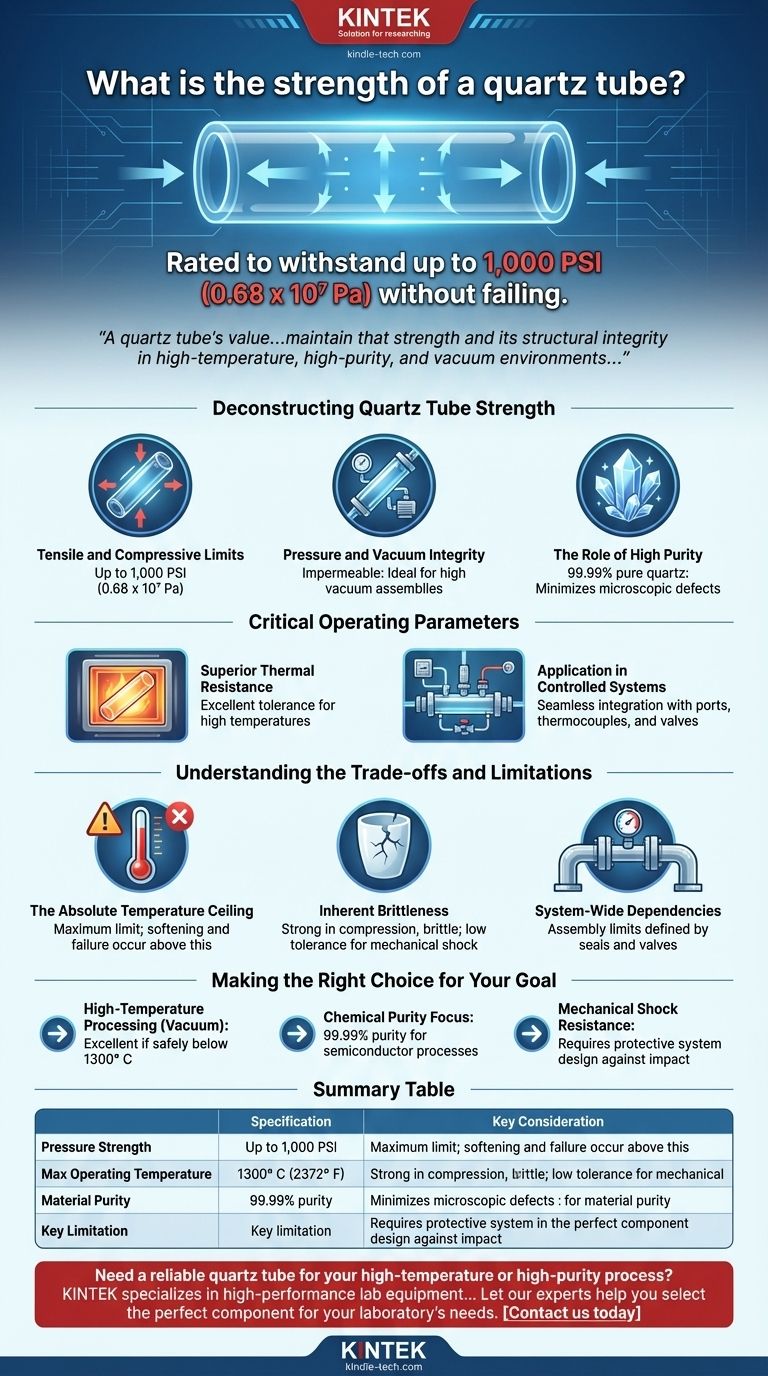
Related Products
- 1400℃ Laboratory High Temperature Tube Furnace with Alumina Tube
- Laboratory High Pressure Vacuum Tube Furnace
- 1200℃ Split Tube Furnace with Quartz Tube Laboratory Tubular Furnace
- 1700℃ Laboratory High Temperature Tube Furnace with Alumina Tube
- Laboratory Rapid Thermal Processing (RTP) Quartz Tube Furnace
People Also Ask
- What is used to measure and monitor the high temperatures needed in heat treating? Master Precise Thermal Control with Thermocouples
- Significance of Grinding Ball Sizes and Ratios for ODS Steel? Optimize Your Milling Process for Superior Alloying
- What is the role of a laboratory heating system in electrolyte ohmic resistance? Optimize Precise Thermal Analysis
- Why are zirconia grinding jars selected for Li7P3S11 solid-state electrolytes? Ensure Purity in Sulfide Synthesis
- What is a Rotary Vane Vacuum Pump? Efficiency and Performance for Laboratory Vacuum Systems
- Why are high-precision temperature-controlled heating stages necessary for Ni-Cr alloys? Ensure Accurate RIS Results
- Why is the use of high-grade corrosion-resistant lab equipment essential? Ensure Safety & Biomass Data Integrity
- How does the vacuum pump system influence siloxane thin film quality? Mastering Purity and Density in Fabrication








